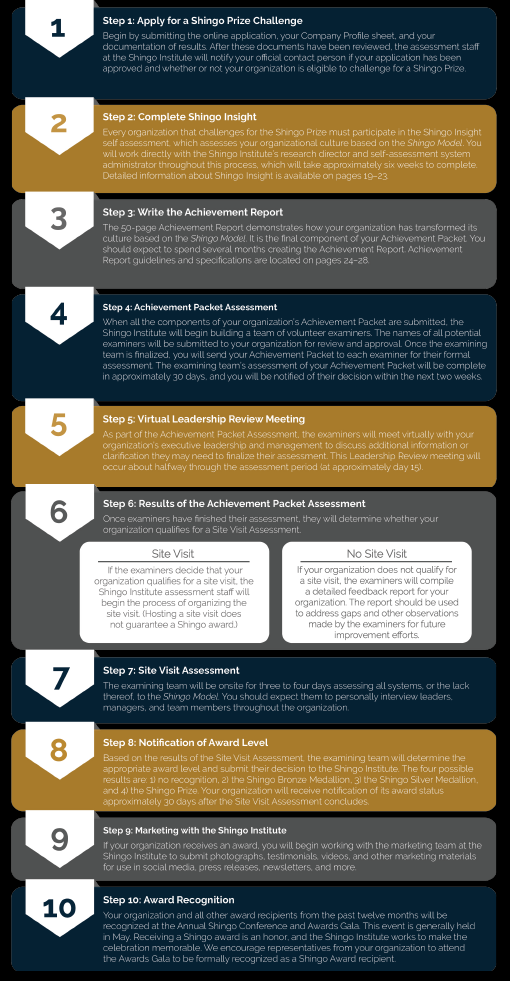by Shaun Barker, Brittney Ogden, and Helen Zak - Shingo Institute Staff Members
The mission of the Shingo Institute is to improve the process of improvement by conducting cutting-edge research, providing relevant education, performing insightful organizational assessments, and recognizing organizations that are committed to achieving sustainable world-class results. Since the inauguration of the Shingo Prize in 1988, thousands of organizations have embraced the Shingo assessment methodology as they have aspired to attain this rigorous standard. To date, more than 350 organizations are recipients of a Shingo award.
The process of a Shingo Prize challenge is not for the faint of heart nor for those wanting to check off a box on a to-do list. The challenge process is designed to be rigorous and thorough. The key word is challenge. We learn best when we are challenged, uncomfortable, and at the edge of our abilities. A Shingo Prize challenge will validate many things you already know about your organization. It will also expose new gaps that can lead to new levels of performance, both in results and in the behaviors that bring about those results.
The three levels of Shingo recognition—Shingo Bronze Medallion, Shingo Silver Medallion, and the Shingo Prize—are awarded based on the level of cultural transformation an organization has achieved. The distinction between award levels is designed to encourage organizations to engage in and leverage the Shingo Model as early as possible in their cultural transformations, and to continue the improvement journey up to and following Shingo Prize recognition.
Not all challenging organizations become recipients of a Shingo award. The Shingo Prize is awarded to organizations that can demonstrate robust key systems that are driving behavior ever closer to the ideal. These behaviors are informed by the principles of organizational excellence and are measured by strong trends and levels of key behavioral indicators (KBIs) and key performance indicators (KPIs).
Benefits of a Shingo Prize Challenge
The process of challenging for a Shingo Prize may seem overwhelming. In this article, we will point to resources that can be most helpful for organizations that are considering challenging for the Shingo Prize. Before we go through the process, we would like to answer an important question that we are commonly asked at the Shingo Institute: What are the benefits of challenging for the Shingo Prize?
Here are just a few benefits to consider:
Another frequently asked question is: What are some of the results organizations realize when they pursue organizational excellence? The following is a small sampling that have been reported by past award recipients:
Safety/Environment/Morale:
Quality:
Cost/Productivity:
Delivery:
Customer Satisfaction:
For more examples, please visit recipient profile sheets on the Shingo Institute website at https://shingo.org/awards/.
Leaders are responsible for the numbers and they must improve the measures. What is commonly passed over or not even addressed is how we achieve the measures or, as the Shingo Model articulates, what behaviors (culture) do we currently have that are driving the results that we get? Furthermore, how do we continually improve our culture to get better, easier, faster, cheaper, and more sustainable results? This is at the heart of the Shingo Prize. Sustainability is when an organization’s culture continually improves the measures they are responsible for while continually striving to improve the culture that achieves the measures.
Resources to Prepare for a Shingo Prize Challenge
The most important aspect of a Shingo Prize challenge is a well-grounded understanding of the Shingo Model and the assessment methodology. The Shingo Institute has developed a series of workshops that help all people in an organization gain this understanding. Detailed information about each of the Shingo workshops is available at https://shingo.org/education/. To accompany the workshop series, the Shingo Institute has also published a series of books based on the Shingo Model. They are available to order at https://shingo.org/books/. The Shingo workshops will help members of an organization understand the complexities of the assessment methodology and how the Shingo examiners will assess the organization. Participating in all six of the workshops, which are offered by Shingo Licensed Affiliates from around the world, should be a priority for any organization before they begin the process of challenging for the Shingo Prize. Please reach out to a Shingo Licensed Affiliate to discuss this option. Information about Shingo Licensed Affiliates is available at https://shingo.org/affiliates/.
Another tool designed to help organizations prepare for a challenge is Shingo Insight. Insight helps organizations understand their current state based on the Shingo Model and specifically the Shingo Guiding Principles. The Shingo Institute has been assessing organizational performance for more than 30 years and has developed a tool for determining the degree to which an organization believes the behaviors of its executives, managers, and team members are aligned with the principles of the Shingo Model. It is a simple tool, such that any organization can easily evaluate itself on a regular basis to help determine if the changes they are making to their systems are actually changing the culture (behavior) and impacting value to the customer (results). Although this is part of every challenge, it can be taken prior to challenging as well. For more information on Shingo Insight, please visit https://shingo.org/insight-assessment/.
Below is a 10-step chart that gives an overview of the entire Shingo Prize challenge process. For more detailed information on the challenging process, please visit the Shingo Institute website at https://shingo.org/awards/challenge-for-the-shingo-prize/ and download the Shingo Prize Challenge Guidelines.
If you have questions that aren’t addressed in the guidelines, contact Brittney Ogden at brittney.ogden@usu.edu, or Shaun Barker at shaun.barker@usu.edu. If you have any questions about Shingo Insight, please contact Helen Zak at helen.zak@usu.edu.

Optional footer text. If none, Advanced > Layout > Display: None